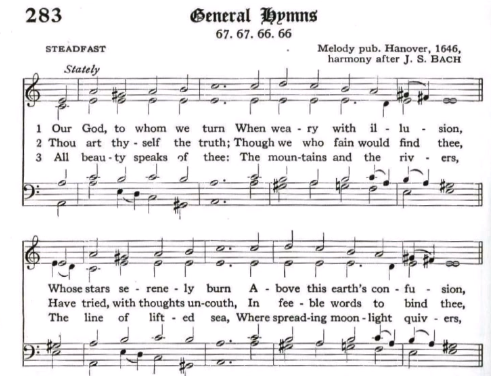Editor’s note: The following sermon was delivered Sunday, October 12, 1890, by the Rev. W. W. Merry, Rector of Lincoln College, University of Oxford.
‘Behold, God is mighty, and despiseth not any.’ — Job xxxvi. 5.
This short and striking estimate of the Divine nature might well arrest our attention, wheresoever we might have found it recorded. It deepens our interest to find it in that marvelous poetic story of ancient days — the Book of Job — which sets forth in vivid, dramatic form those questionings and those mysteries which are ever old and ever new — the relation of suffering to sin; the compatibility of divine power and goodness; the meaning of chastisement; the hope of a final redemption.
It is important, too, that we should notice the point in the drama at which the words occur. Elihu has already set out his views with some fullness; but now, with a sort of serious daring, he announces that he has yet much to speak on God’s behalf — ‘to fetch knowledge,’ as he phrases it, ‘from afar, and to ascribe righteousness to his Maker.’
You will remember how the lines of the action of the book reach this point. Eliphaz has fallen short of any satisfactory presentment of God’s relation to man. He is a slave to rule and formula; to dogma and stereotyped idea. Although he is not out of sympathy with his afflicted friend, his estimate of Job’s position shows neither breadth nor elasticity of view. Bildad stands at a lower level. He is unable to rise above the most conventional ideas of the moral government of the world. His loftiest thought ends with the incomprehensible majesty of God, and the nothingness of man. There was little help for Job so far, in the comments of his comforters. But even these shallow and incomplete conceptions are adequate and liberal, contrasted with the narrow bigotry of Zophar, who can see nothing in his friend’s trials beyond a clear proof of his wickedness and hypocrisy. Here Elihu steps forward; the reluctance of a young man’s diffidence being overcome by the strength of his righteous indignation. He is dissatisfied with Job’s self-vindication, which seems to reflect dishonour upon God; but his wrath is kindled against the three friends who have hitherto spoken, because ‘they had found no answer, yet had they condemned Job.’ Elihu sees what the others had failed to note — that chastisement is not simply penal or vindictive; that it has a far larger scope, admonitory, deterrent, disciplinary, remedial. Thus, Job’s affliction had been cruelly misrepresented; but Job himself was not free from blame. He had failed to understand the indissoluble union of the justice and goodness of God; he had not fully realized that His almighty power could not be associated with anything like neglect for the weakest of His creatures. ‘Behold, God is mighty, and despiseth not any.’
We are repelled by the thought of a being of vast power, using that power for no beneficent purpose, but in profound security of its possession despising the weakness of those who cannot menace it. Tint the picture as you please, you will not alter the main effect. Tone it delicately — and you see the gods of Epicurus in their golden houses, smiling at the cry that comes up from the struggling world below them. Paint it in coarse and lurid colours — and you have Caliban’s conception of Setebos, ‘altogether such an one as himself’; a being of mere reckless caprice. This is Caliban’s idea of the use of power : —
Am strong myself compared to yonder crabs,
That march now from the mountain to the sea.
Let twenty pass, and stone the twenty-first;
Loving not, hating not, but just choosing so.
Or, if you desire to see a still more definite combination of power with contemptuousness, you might seek it among the ruins and the rock-tombs of Egypt, and note the quiet scorn expressed in the features of gods and kings. The soul of the worshiper must have sunk within him, as he looked in the face of the deity, whose favour he sought, or whose vengeance he deprecated. Carven across the powerful breast and shoulders he would see the sceptre and the flail — emblems of sovereignty and punishment; and on the supercilious brow and tranquil lips a bland look of ineffable indifference, that regarded with equal calmness the joy or the agony of his votary. Or, look at that royal tomb. There is a procession of captives rank after rank, with the halter round their necks. In the midst stands the gigantic form of a Rameses, sword in hand, serene and unruffled, while the poor victims pass along to slavery or death. Such a petty tragedy as this could never break his contemptuous calm! This picture seems to me infinitely more terrible than the most violent presentation of fury or malevolence. Malevolence admits the importance of its foes; their overthrow is worth the trouble of effort and struggle, of scheme and intrigue. But here is the exhibition of mere power, not startled from its even balance by the sense of formidable antagonism, nor thawed from its icy indifference by one soft breath of mercy or compassion. It is indeed a mightiness that despiseth.
The most splendid imagery in the Book of Job is employed in the setting forth of the power of God. The pillars of heaven tremble at His reproof — His lightning goeth forth, and after it a voice roareth — He spreadeth out the sky — He shutteth up the sea with doors, and layeth the foundations of the earth — the stars in their courses follow the guidance of His hand — He saith to the rain and to the snow, ‘Be thou upon earth’ — with God is terrible majesty. And when by these fast-succeeding pictures of the divine glory our thoughts have been profoundly stirred, till we seem now to be lifted up to the heaven above, where stands His throne, now to be carried down to the depth beneath, that is naked and open to His eyes; and when we think we have reached — as the Psalmist says — ‘an end of all perfection,’ we are quietly reminded that we are but looking at the beginning of the revelation, the outward skirts of the glory, even as it was shown to Moses, when the Lord passed by. ‘Lo, these are parts of His ways,’ cries Job: ‘but how little a portion is heard of Him; the thunder of His power who can understand?’ Such thoughts, unsoftened or unrelieved, are crushing to human weakness. The terrible sense of overwhelming power may come upon a man’s soul even in the midst of his devotion, and force from his lips the bitter cry, ‘Think no scorn of me, lest I be like them that go down to the pit; despise not the work of Thine own hands.’
In his humiliation the worshiper seems to regard such scorn as only natural. He deprecates it; but yet it seems conceivable.
Thus we feel that the noblest thoughts in Elihu’s speeches are most happily summed up in the words chosen for our text. They express a thorough sense of the perfect union of power and goodness in the attributes of the great Judge of all the earth.
This union is regarded throughout the Bible as the sure ground for man’s humility and man’s hope. We hear the announcement of it again and again in the prophetic books, while it sounds in a full harmony in the Gospels. When Christ was revealed as ‘the brightness of the Father’s glory and the express image of His person,’ He taught us to base the very possibility of all our prayer on this sense of God’s power and goodness. ‘After this manner therefore pray ye, “Our Father which art in Heaven” ‘ — as though He would say, ‘Think of Him as Maker and Lord of all, dwelling in the light which no one can approach unto: and yet, come to His throne, as children come to their father.’
We cannot face the thought of power and majesty unless it is tempered by the assurance of kindness and graciousness. And so, when St. Paul sought for words wherewith to characterize the law and the commandment of God, he was obliged to group his epithets together. No one word was broad enough to express their manifold qualities. ‘The law is holy,’ he writes, ‘and the commandment holy, and just, and good.’ The first of his three epithets is meant to describe the awful sanctity of the divine law. It was in this shape that it was announced to Israel, as they lay encamped before Sinai. Every circumstance that attended its promulgation was superhuman and terrifying — the thick darkness, the thunder-peal, and the voice of words which forced Moses to confess, ‘I exceedingly fear and quake.’ The very holiness of the law kept men at a distance. But it was also ‘just.’ Here it came into immediate contact with human life, measuring with a righteous measure and judging with strict judgement; weighing the result of men’s lives against the chances and opportunities that had been presented to them, and leaving the decision to be ratified by the echo of conscience. Yet both these aspects of the divine law appall us. Our mortal frailty sinks at the sight of its holiness: our sense of sinfulness finds little comfort in the contemplation of its justice.
But, says the Apostle, ‘the commandment is good.’ There is a sense of relief in this word: it has a sound of sympathy. We have left the beetling crags of Sinai for the homes of men. We seem to be dealing no longer with a system, but with a person, in whose breast a human heart is beating. ‘The commandment is good’: it blends the exercise of mercy with that of justice: it is full of consideration: it is instinct with charity: it ‘can have compassion on the ignorant, and on them that are out of the way.’ The smallest, the weakest, the most fearful are drawn to it, because it is ‘good.’ For this goodness is very tender. It keenly appreciates the rights of the least, as well as of the greatest. Nothing is too unimportant for its kindly eye; nothing so humble as to be beneath the help of its gracious care. Herein is the glory of God’s law, and of every law that is modeled upon the divine pattern. It is very ‘mighty,’ but it ‘despiseth not any.’
The true greatness of a man’s nature may some times seem at first sight to be nothing more than the simple expression of an innate magnanimity, which has grown with his growth and strengthened with his strength. More likely is it the grand result of a long struggle against his lower self; the victory after a steady fight against conceit and prejudice; the ripe wisdom of one who has grasped the meaning of life, and has learned why he must sympathize with his fellow men. But this is a lesson which some of us find too hard to learn, or too difficult to retain. Is there not a real temptation to despise the defenceless? Do we not touch with respectful caution anything that can retaliate, that can give sharp expression to its wounded feelings — whether it be man or beast? But that which is powerless, or which endures in silence, we are apt to treat with a careless freedom — I will not say ‘with cruelty,’ but with something which savours too strongly of contempt It was to meet the case of such and suchlike temptation, that our Lord, with His gracious hands upon the children’s heads, looked round upon the disciples who stood about Him, and said, ‘See that ye despise not one of these little ones.’ It is as true for us as for them: we cannot afford to do so; not only because of our own shortcomings, but because of our own shortsightedness in estimating others, and, above all, because of the preciousness of each individual in the sight of that God, who is ‘mighty, and despiseth not any.’
When shall we learn that contemptuousness and greatness of soul cannot exist together? I read in the legend of the Round Table, how that
No knight of Arthur’s noblest dealt in scorn.
Such a graceless spirit was left to the treacherous Vivien; or to Modred, misshapen in body and soul, — Modred
With silent smiles of slow disparagement.
Let us look to the nobility of our knighthood, lest there be more of Modred in us than of Percival or Galahad.
In our life in this place, amid all its generous impulses, in spite of its happy freedom, there is too often a spirit of scorn abroad which chills and kills much that ought to live and thrive. I am not thinking for the moment of the nil admirari farce, the language and attitude of professional cynicism, which I have seen sometimes affected by those whose profound conviction of the hollowness of life and the folly of enthusiasm comes from the wide and varied experience of some twenty years. This is not much more important than a trick of demeanour, or a weak attempt to give dignity to a peevish phase of vanity. But I am thinking of a more serious temptation. Do we never see in this University the tendency of the young to despise the older for their conservatism, their caution, their slowness; while the older are not free from the temptation to think lightly of the young, because youth seems to them to suggest crudeness, haste, ignorance? Such feelings are on the high road to contempt, and when contempt has once been reached, farewell to all sympathy! farewell to the last possibility of happy, confident intercourse!
Cannot we who are older, and you who are younger, have the wisdom to see that there is no hard and fast line between us, across which we are expected to look askance at one another? If the younger have much to learn from the experience and guidance of the older, the older, in their turn, owe an infinite debt to the eagerness, the brightness, the open-heartedness of those who are young. The failure to recognize this happy interdependence breeds only too surely that want of trust which may harden into antagonism or freeze into scorn. Yet I would gladly teach you, young men, a lesson of contempt, if you will undertake to reserve it for the right objects. Keep it for that vapid idleness which is only busy in the effort to kill time. Keep it for the empty extravagance which tries to achieve popularity, or notoriety, by expensive luxury and swaggering insolence. Keep it for the selfishness which holds nothing sacred that can minister to its pleasure. Keep it for the irreverence which ignores purity and sneers at holiness. With the keen cold steel of your severe contempt you may thus cut down not a few of the worst foes that threaten the manliness and the dignity of your life in this place. But can you say that our contempt is commonly reserved for these sins and follies, which really deserve it? Too often we grant them a very easy tolerance, or encourage them by a sneaking admiration, while we keep our scorn for a simplicity which may be far purer and better than our more varied experience; and for a modesty which may be infinitely more dignified than our own assurance and self-complacency. Contempt is a terrible weapon, only to be used advisedly, earnestly, and with a deep sense of responsibility. But I pray you to think how often in our social intercourse we cut and slash with it in utter recklessness. Can I not find easily enough some careless man, whom I might gravely remind of what he has done in the thoughtlessness of his soul? ‘You have visited with your contempt,’ I might say, ‘the poverty of one who has been more faithful over his few things than you have been over your many chances and fine opportunities. You have used it to ridicule failure, which has been far nobler than your lightly won success. You have used it to make sport of those scruples and misgivings and perplexities, which you cannot understand because you have not thought it worth your while to fight your way to convictions. You have employed it to wound the tender conscience, which to your coarser view appears to be morbid.’ Yet ‘God is mighty, and despiseth not any.’ How will our life show in the light of that great divine example? We are said to be drawing nearer day by day to Socialism. Make it your resolve to bring that prophecy to a happy fulfillment, if by Socialism you mean an appreciation of every man’s value and indefeasible rights, and his place in the great brotherhood of humanity. If you live up to that spirit, and fight against all temptations to be false to it, you may make the Apostle’s words your own, and say, ‘We know that we have passed from death unto life, because we love the brethren.’
Lastly, let me call to your notice how the acknowledgement that God ‘despiseth not any’ rings the knell of many false and flattering beliefs. It demolishes the hope of escaping judgement on the ground of personal insignificance. It disposes of the possibility of passing muster as one of ‘the indistinguishable many.’
The grand fact that God ‘despiseth not any’ delivers the anxious and oppressed from the fear of being neglected, or forgotten, or passed over, in the movement of a great system that cannot pause to take account of the units with which it works — careful of the type, but careless of the single life. In our knowledge of God’s nature the dread of individual effacement disappears. However humble, however weak, however poor, each one stands clear and distinct before God, the object of His fatherly regard; each with his own part defined and detailed in the redeeming love of Christ. And he who would seek to make light of the strictness of God’s assessment finds something here to waken him to serious thought. If the voice of temptation whispers to him that God’s regard for the world is, after all, a distant one, and His interest in it general rather than particular: if it suggests to him that he may lightly sin, may coolly renounce his Christian allegiance, may complacently throw in his lot with a world which knows not God — then let the sobering recollection rise within him that ‘God is mighty, and despiseth not any.’ Mighty to espy, to detect, to sentence, to punish: too just to despise or to ignore the unfaithfulness or disloyalty of the least of all His servants. The prayer of an honest man, whose genuine desire is that he may know himself as clearly as God knows him, might well be thrown into those words of sincerity and devotion, which we all are familiar with, but which only the man who is in earnest can dare to use — ‘Try me, O God, and seek the ground of my heart; prove me and examine my thoughts; look well if there be any way of wickedness in me, and lead me in the way everlasting.’









